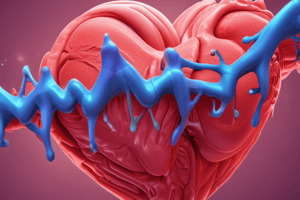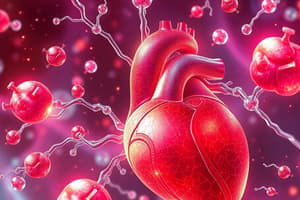Podcast
Questions and Answers
What is another name for Digoxin?
What is another name for Digoxin?
Lanoxin
What class does Digoxin belong to?
What class does Digoxin belong to?
- Diuretic
- Antihypertensive agent
- Beta blocker
- Inotropic agent (correct)
What is one mechanism of action of Digoxin?
What is one mechanism of action of Digoxin?
Increases force of myocardial contraction
Which of the following is an indication for Digoxin?
Which of the following is an indication for Digoxin?
What is a contraindication for the use of Digoxin?
What is a contraindication for the use of Digoxin?
What is a common adverse reaction of Digoxin?
What is a common adverse reaction of Digoxin?
Which drug interaction can increase serum Digoxin concentrations?
Which drug interaction can increase serum Digoxin concentrations?
How is Digoxin supplied?
How is Digoxin supplied?
What is the adult loading dose for Digoxin?
What is the adult loading dose for Digoxin?
Digoxin is recommended for use in the prehospital setting for pediatric patients.
Digoxin is recommended for use in the prehospital setting for pediatric patients.
What is the duration of action for Digoxin?
What is the duration of action for Digoxin?
What pregnancy category is Digoxin classified under?
What pregnancy category is Digoxin classified under?
Flashcards are hidden until you start studying
Study Notes
Digoxin Overview
- Digoxin, also known as Lanoxin, is a medication used primarily for heart conditions.
Classification
- Classified as an inotropic agent and cardiac glycoside, it influences heart contractility.
Mechanism of Action
- Functions as a rapid-acting cardiac glycoside.
- Enhances the force of myocardial contraction and increases the refractory period of the AV node.
- Elevates total peripheral resistance, impacting overall cardiovascular function.
Indications for Use
- Prescribed for congestive heart failure and re-entry supraventricular tachycardias (SVTs).
- Used for ventricular rate control in cases of atrial flutter and atrial fibrillation.
Contraindications
- Not suitable for patients with ventricular fibrillation or ventricular tachycardia.
- Avoid in cases of digitalis toxicity and hypersensitivity to digoxin.
Adverse Reactions and Side Effects
- Common side effects include fatigue, headache, and blurred vision, particularly yellow or green.
- Other serious effects may include seizures, confusion, bradycardia, dysrhythmias, nausea, vomiting, anorexia, and skin rash.
Drug Interactions
- Co-administration with amiodarone, verapamil, or quinidine can significantly increase serum digoxin levels (by 50%-70%).
- Concurrent use of digoxin and verapamil can lead to severe heart block.
- Diuretics can enhance cardiac toxicity.
Supply Information
- Available in vials at a concentration of 0.25 mg/mL.
Dosage and Administration
- Adult loading dose is 4-6 mcg/kg administered over 5 minutes; subsequent doses of 2-3 mcg/kg may follow at 4- to 8-hour intervals.
- Not recommended for pediatric use in a prehospital setting.
Duration of Action
- Onset of action occurs within 5-30 minutes, with peak effects seen in 30-120 minutes.
- Effects may last several days.
Special Considerations
- Pregnancy safety category C; monitor patients receiving IV digoxin.
- Patients with renal failure are at higher risk for digitalis toxicity.
- Conditions like hypokalemia, hypomagnesemia, and hypercalcemia can exacerbate toxicity.
- Use cautiously in patients with Wolff-Parkinson-White syndrome.
Studying That Suits You
Use AI to generate personalized quizzes and flashcards to suit your learning preferences.




